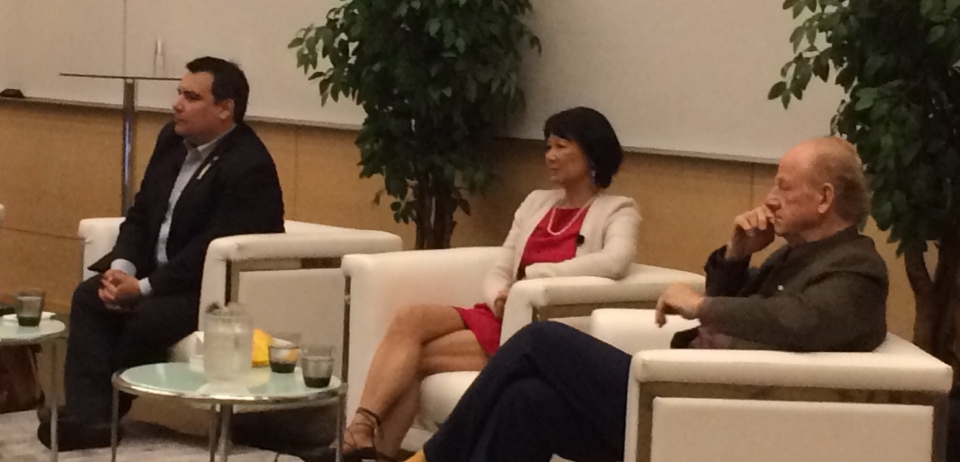The Congress of the Humanities and Social Sciences brings together leading thinkers, academics, researchers, policy-makers and innovators to explore some of the world’s most challenging issues. Congress celebrates the vitality and quality of Canadian research contributions, and helps train the next generation of Canadian ideas leadership. This year’s theme “The Next 150, on Indigenous Lands" celebrates the history, legacy and achievements of the peoples and territories that make us who we are, and anticipates the boundless opportunities of the future. Organized by the Federation for the Humanities and Social Sciences, this year’s Congress is being hosted by Ryerson University in Toronto from May 27-June 2. Follow this series of Big Picture at #congressh blogs.
In the first of Congress 2017’s Big Thinking series, writer and activist Professor Niigaanwewidam James Sinclair, public figure and politician Olivia Chow, and author and philosopher John Ralston Saul discussed ways forward for redefining citizenship in the light of a critical re-examination of our history and our nation.
Professor Sinclair began the discussion by describing how Indigenous notions of citizenship are based on family: to be a good citizen is to be a good family member. This means not merely to have a series of individual rights and freedoms, but to have serious responsibilities to take care of each other and the world around us. Decrying the human centrism of the values and notions we inherited from Europe, Sinclair reminded the audience that the story of Canada is being continuously written by more than just humans: plants, animals, birds, water, and rocks are all “textual creators” contributing to our history, our identity, and of course our environment. As citizens, said Sinclair, it is our duty to read the earth and question the literacy of those of us who seek to exploit our natural resources, regardless of the consequences, to the detriment of all.
Olivia Chow reminded us that the story of Canada’s past, present, and future is not only that of the fraught relationship between the Indigenous people and colonial populations—a history marred by racism, exploitation, and genocide. Canada’s story is also that of the early immigrants of colour, such as the Chinese immigrants who built the railroad only to be denied citizenship by blatantly racist immigration laws. Chow also urged officials and government departmental different levels to find institutional initiatives—from parks to school systems— to help new Canadians better understand Canada’s colonial history.
John Ralston Saul called for the complete reimagining of our public institutions, including our political system and our universities. According to Dr. Saul, the Westphalian European system has fundamentally failed Canada, directly contributing to the institutionalized racism that has marred our history, and that our status as one of the most successful immigrant states in the modern world was achieved in spite of that inheritance, not because of it. He said we must carry the burden of our past wrongs while rediscovering and reinventing our concepts of citizenship and nationhood by looking toward and embracing our multicultural system based on Indigenous values rather than European ones. For Saul, this begins with putting Indigenous and Canadian philosophy front and centre in future curricula.
Going forward means rethinking our relationship to our past, our environment, or each other. Whether it is facing the harsh reality that “racism is the fabric of the country” according to Sinclair or admitting that “the European relationship to the land is barbaric” according to Saul, it is our responsibility to look to a new partnership with Indigenous peoples and to all peoples and cultures in Canada to find new models for our institutions and new ways of working together.
Niigaanwewidam James Sinclair, Olivia Chow and John Ralston Saul together delivered a Big Thinking lecture entitled Five hundred years of building diversity: Canadian citizenship at the future’s edge yesterday at Congress 2017 at Ryerson University. Watch the video here.

